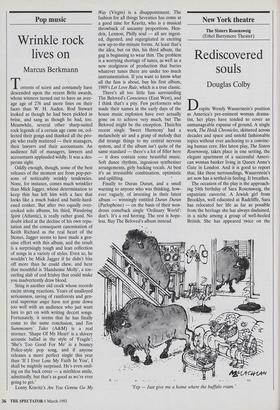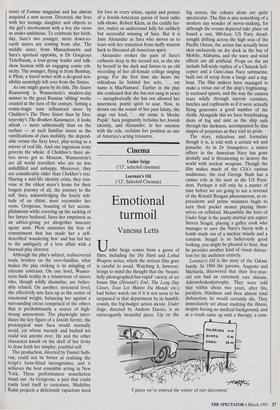New York theatre
The Sisters Rosensweig (Ethel Barrymore Theater)
Rediscovered souls
Douglas Colby
Despite Wendy Wasserstein's position as America's pre-eminent woman drama- tist, her plays have tended to cover an unmanageable expanse of ground. A single work, The Heidi Chronicles, skittered across decades and space and untold fashionable topics without ever anchoring to a convinc- ing human core. Her latest play, The Sisters Rosensweig, takes place in one setting, the elegant apartment of a successful Ameri- can woman banker living in Queen Anne's Gate in London. And it is good to report that, like these surroundings, Wasserstein's art now has a settled-in feeling. It breathes.
The occasion of the play is the approach- ing 54th birthday of Sara Rosensweig, the expatriate careerist. A Jewish girl from Brooklyn, well educated at Radcliffe, Sara has relocated her life as far as possible from the heritage she has always disdained, in a niche among a group of well-heeled British. She has appeared twice on the 'Yep — Just give me a home where the buffalo roam.' cover of Fortune magazine and has almost acquired a new accent. Divorced, she lives with her teenage daughter and objects to the girl's involvement with a boy she views as under-ambitious. To celebrate her birth- day, Sara's two younger, more down-to- earth sisters are coming from afar. The middle sister, from Massachusetts and Sara's spiritual opposite, is Dr Gorgeous Teitelbaum, a tour-group leader and talk- show hostess with an engaging comic eth- nicity. The younger, flying in from Bombay, is Pfeni, a travel writer with a do-good sen- sibility seemingly left over from the Sixties.
As one might guess by its title, The Sisters Rosensweig is Wasserstein's modern-day answer to the great Russian 'sibling' works created at the turn of the century. Setting a comic-tragic tone influenced more by Chekhov's The Three Sisters than by Dos- toyevsky's The Brothers Karamazov, it looks afresh — more subtextually than on the surface — at such familiar issues as the ramifications of class mobility, the depend- able versus the fiery lover, play-acting as a mirror of real life. And one ingenious irony governs the whole: if Chekhov's three sis- ters never got to Moscow, Wasserstein's are all world travellers who are no less unfulfilled and unhappy. Moreover, they are considerably older than Chekhov's trio. Sharing a mid-life identity crisis, they con- vene at the eldest sister's home for their longest journey of all, the journey to the self. Sara, acknowledging the lonely soli- tude of an elitist, must reconsider her roots. Gorgeous, boasting of her accom- plishments while covering up the sacking of her lawyer husband, faces her emptiness as an advice-giving yet altogether insecure agony aunt. Pfeni examines the fear of commitment that has made her a self- described 'wandering Jew' and has led her to the ambiguity of a love affair with a bisexual play director.
Although the play's subject, rediscovered souls, borders on the over-familiar, what makes the play striking is its mingling of extreme contrasts. On one level, Wasser- stein finds reality in a triumvirate of sisters who, though wildly dissimilar, are believ- ably related. On another, structural level, she effectively sets Sara up as the centre of emotional weight, balancing her against a surrounding circus comprised of the others that is predominantly a source of high- strung amusement. The playwright intro- duces the key figure of a Jewish furrier, the prototypical man Sara would normally avoid, yet whose warmth and barbed wit could win anyone over. He and the other characters knock on the shell of her levity to draw forth her simpler, youthful self.
The production, directed by Daniel Sulli- van, could not be better at realising the script's form-fitted incongruities, and it achieves the best ensemble acting in New York. Three performances nonetheless stand out. As Gorgeous, a part that could easily lend itself to caricature, Madeline Kahn projects a deliciously rapacious need for love in every whine, squint and prance of a Jewish-American queen of local radio talk-shows. Robert Klein, as the cuddly fur- rier, makes us understand fully his unlikely but successful winning of Sara. But it is Jane Alexander as Sara who moves us to tears with her transition from stuffy matron back to liberated all-American spirit.
Alexander evokes the pain of Sara's catharsis deep in the second act, as she sits by herself in the dark and listens to an old recording of her all-female college singing group. For the first time she hears the ridiculous lie behind her solo, `. . . my name is MacNamara'. Earlier in the play she confessed that she has not sung in years — metaphorically she has not allowed her innermost, poetic spirit to soar. Now, to drown out the sound of her past falsity, she sings out loud, `. . my name is Moshe Pupik'. Sara poignantly reclaims her Jewish identity, and Alexander, in her oneness with the role, reclaims her position as one of America's acting treasures.



















































 Previous page
Previous page